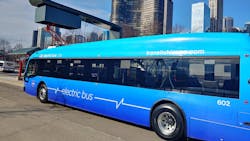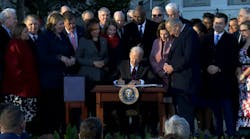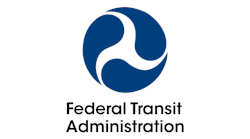FTA opens funding for nearly $1.5 billion in grants to modernize bus fleets and facilities
The Federal Transit Administration (FTA) has opened the first competitive grant opportunity under the Bipartisan Infrastructure Law with the Notice of Funding Opportunity for nearly $1.5 billion combined available funding through the Low or No Emission (Low-No) Grant Program and the Grants for Buses and Bus Facilities Program.
The Low-No Grant Program will have $1.1 billion available to help transit agencies purchase or lease low- or no-emission vehicles that are built in the United States. Under the Bipartisan Infrastructure Law, the Lo-No Grant Program is provided with $5.5 billion over five years, which is more than 10 times greater than the previous five years of funding under the program.
FTA’s Grants for Buses and Bus Facilities Program has $372 million available in this round of grants, which will help agencies purchase and rehabilitate buses, vans and other related equipment and build bus facilities.
"Manufacturing thousands of new, American-built buses will create jobs all over our nation, offering cleaner, faster and safer rides as we move toward a better transportation future," said FTA Administrator Nuria Fernandez. "When transit agencies are applying for these grants, they will propose projects that address climate change, improve air quality, open new opportunities and include workforce training to help workers transition to operating and maintaining these new, clean energy fleets."
The funding opportunity was announced during an event with Vice President Kamala Harris outlining the Biden Administration’s approach to reduce pollution through cleaner fleets. The administration notes heavy-duty vehicles make up nearly one-quarter of all U.S. transportation greenhouse gas emissions.
“I am proud to announce that our administration is taking steps to build that better future by transforming our nation’s fleet of buses and trucks. And that transformation will begin with public buses,” said Vice President Harris. “These grants will make public transit more reliable and more affordable, which, of course, means shorter waits and more reliable commutes for folks who need to take public transit to get where they need to go. These buses will be built in America. And these grants will also be used to train drivers and mechanics to operate, maintain and repair this new technology. This investment will create good jobs — jobs of the future.”
The administration also notes the inclusion in the Bipartisan Infrastructure Law of the first dedicated investment in the transit workforce, which will see five percent of grants (up to $280 million over five years) used to fund workforce development training to upskill the transit workforce to maintain and operate zero-emission fleets and their associated charging infrastructure.
“Our transportation sector has reached a turning point. We are all in the midst of a turning point. We have the technology to transition to a zero-emission fleet. Our administration — together, all of us — is working to make that possibility a reality,” said Vice President Harris.
Proposals for the two grant programs should be submitted through grants.gov by 11:59 p.m. Eastern on May 31, 2022.

Mischa Wanek-Libman | Group Editorial Director
Mischa Wanek-Libman is director of communications with Transdev North America. She has more than 20 years of experience working in the transportation industry covering construction projects, engineering challenges, transit and rail operations and best practices.
Wanek-Libman has held top editorial positions at freight rail and public transportation business-to-business publications including as editor-in-chief and editorial director of Mass Transit from 2018-2024. She has been recognized for editorial excellence through her individual work, as well as for collaborative content.
She is an active member of the American Public Transportation Association's Marketing and Communications Committee and served 14 years as a Board Observer on the National Railroad Construction and Maintenance Association (NRC) Board of Directors.
She is a graduate of Drake University in Des Moines, Iowa, where she earned a Bachelor of Arts degree in Journalism and Mass Communication.




